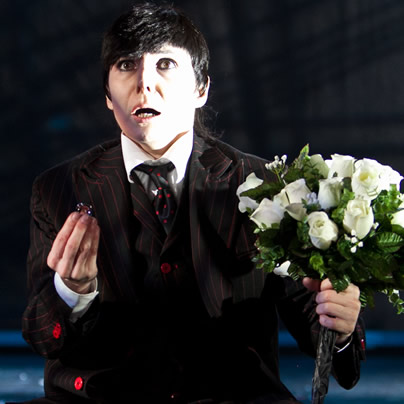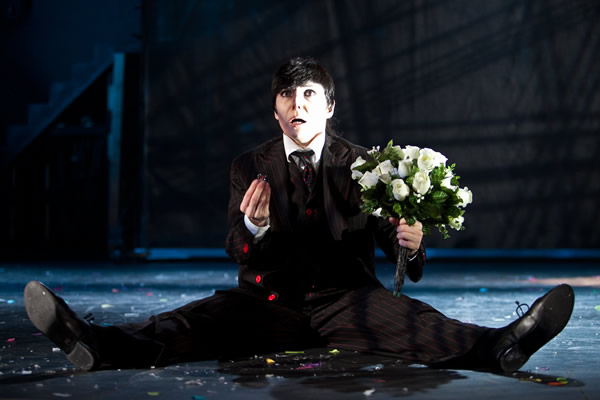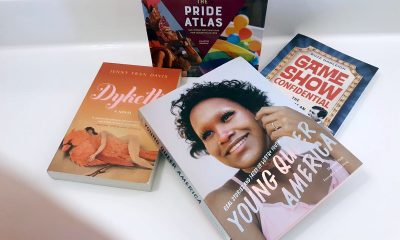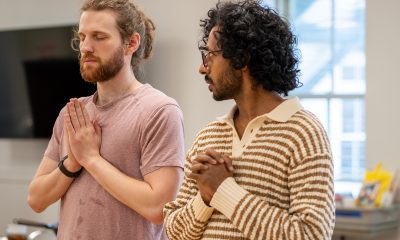Arts & Entertainment
‘Twelfth’ goes ‘20s
New Synetic adaptation takes the Bard to the flapper era


Irina Tsikurishvili as Viola in ‘Twelfth Night.’ (Photo by Koko Lanham; courtesy Synetic)
‘Twelfth Night’
Through Feb. 16
Synetic Theater
1800 South Bell Street, Crystal City, VA
$35 and up (some discounts available)
866-811-4111
Ordinarily when we meet “Twelfth Night’s” Viola she’s just been washed ashore after a terrible ship wreck. Not in Synetic Theater’s roaring ‘20s take on the Shakespeare comedy.
Here, the yacht is still very much afloat with onboard flappers and their beaus enjoying a wild Gatsby-esque party. Viola (Irina Tsikurishvili) and her twin Sebastian (Alex Mills) are the main attraction, a magnetic sibling dance team not unlike the elegant young Fred and Adele Astaire, only more double-jointed. It’s a great party, but everyone ends up under water just the same.
Once on dry land — alone and in a strange place — Viola disguises herself as a man and goes to work for Duke Orsino (Philip Fletcher). As Cesario, Viola’s newly assumed name, she carries letters between the duke and the object of his unrequited passion Olivia (Kathy Gordon). But the gender-bending plot thickens when Olivia is instantly smitten with Cesario. Viola, in turn, falls for Orsino. What’s more, there are zany subplots involving more unrequited feelings and a devastating prank. Billed as a comedy, “Twelfth Night” boasts many moments of hilarity but there’s sadness too (Viola believes her twin has died at sea). Director Paata Tsikurishvili doesn’t neglect those darker moments — he gets the balance just right.
Fittingly the movement-based company whose players almost never utter a sound has set the 10th addition to its Silent Shakespeare series on a silent movie stage — the type that would later be converted into “sound stages” with the advent of the “talkies.” The action unfolds as a silent comedy directed by Olivia’s household fool Feste (Ben Cunis) with the help of his clownish cinematographer sidekick Fabian (Vato Tsikurishvili) who both step in and out of the action, playing their parts in the story when needed. This works wonderfully particularly since Feste is an almost omniscient presence in the original text.
The production draws broadly from the voiceless genre: sepia-toned subtitles on a movie screen, frantically paced comedy, lots of physical comedy and even the old pie-in-the-face bit. But the scenes most reminiscent of the silent cinema era are those with Viola/Cesario. It’s Tsikurishvili as the resilient cross-dressing heroine who shines most brightly. With an economy of movement, brilliant attention to detail and expressive face — all reminiscent of Chaplin’s iconic bowler-wearing little tramp, she recreates the best of silent film.
An early scene in which Tsikurishvili’s Cesario gets acquainted with Orsino (played wonderfully as a schmaltzy lothario by Fletcher ,who is gay) has the feel of a true silent comedy. It’s especially well thought out and executed. Her scenes with twin Sebastian (out actor Alex Mills) are also memorable, ranging from high spirited to wistful. The talented cast nicely assays the supporting stock characters including Gordon’s vampy Oliva; the lush, Sir Toby Belch (Hector Reynoso); and an over eager college boy, Sir Andrew Aquecheek (Dallas Tolentino). Irakli Kavsadze is perfect as the solemn yet ridiculous butler, Malvolio.
In addition to playing Viola, Tsikurishvili is also the production’s choreographer. Like all Synetic productions, movement affects the mood and emotion deeply and often instantly. Here it’s during the shipwreck when partiers who seconds ago were dancing the fox trot, Charleston and athletic Lindy Hop (all new to Synetic), are suddenly deep underwater, moving slowly but beautifully in a quest for survival.
Phil Charlwood’s set is a functional amalgam of ropes, pulleys, rolling cameras, big lights and a moveable screen. And Kendra Rai’s costumes are spot on — white dinner jackets and glittery above the knee dresses. Especially good is Olivia’s dramatic mourning weeds — her stylish black dress and long veil bring to mind the many bereft young (and not so young) women who turned up at the funeral for ‘20s heartthrob Rudolf Valentino.
Synetic’s “Twelfth Night” closes by flashing the play’s most famous line across the screen: “If music be the food of love, play on …” And with that the cast — led by Tsikurishvili — erupts into a big, exuberant dance number inspired by the infectious beats of jazz great Gene Krupa’s “Swing Swing Swing.” It’s the kind of big number you’d expect to see in a hot production of “Anything Goes” or “42nd Street.” Not your typical Synetic fare, but they nail it. And to make no mistake it’s them, the company drops some of their own high flying acrobatic moves into this treat of an upbeat curtain call.
Sports
Bisexual former umpire sues Major League Baseball for sexual harassment
Brandon Cooper claims female colleague sexually harassed him

A fired former umpire is suing Major League Baseball, claiming he was sexually harassed by a female umpire and discriminated against because of his gender and his sexual orientation.
Brandon Cooper worked in the minor league Arizona Complex League last year, and according to the lawsuit he filed Wednesday in federal court in Manhattan, he identifies as bisexual.
“I wanted my umpiring and ability to speak for itself and not to be labeled as ‘Brandon Cooper the bisexual umpire,’” he told Outsports. “I didn’t want to be labeled as something. It has been a passion of mine to simply make it to the Major Leagues.”
But that didn’t happen. Instead of being promoted, he was fired. His suit names MLB and an affiliated entity, PDL Blue, Inc., and alleges he had endured a hostile work environment and wrongful termination and/or retaliation because of gender and sexual orientation under New York State and New York City law.
“Historically the MLB has had a homogenous roster of umpires working in both the minor and major leagues,” Cooper claims in his suit. “Specifically, to date there has never been a woman who has worked in a (regular) season game played in the majors, and most umpires are still Caucasian men. To try to fix its gender and racial diversity issue, defendants have implemented an illegal diversity quota requiring that women be promoted regardless of merit.”
Cooper claims former umpire Ed Rapuano, now an umpire evaluator, and Darren Spagnardi, an umpire development supervisor, told him in January 2023 that MLB had a hiring quota, requiring that at least two women be among 10 new hires.
According to the suit, Cooper was assigned to spring training last year and was notified by the senior manager of umpire administration, Dusty Dellinger, that even though he received a high rating in June from former big league umpire Jim Reynolds, now an umpire supervisor, that women and minority candidates had to be hired first.
Cooper claims that upon learning Cooper was bisexual, fellow umpire Gina Quartararo insulted him and fellow umpire Kevin Bruno by using homophobic slurs and crude remarks. At that time, Quartararo and Cooper worked on the same umpiring crew and being evaluated for possible promotion to the big leagues.
This season, Quartararo is working as an umpire in the Florida State League, one of nine women who are working as minor league umpires.
Cooper said he notified Dellinger, but instead of taking action against Quartararo, he said MLB ordered Cooper to undergo sensitivity training. According to his lawsuit, he was also accused of violating the minor league anti-discrimination and harassment policy.
Cooper’s suit says he met with MLB Senior Vice President of Diversity, Equity and Inclusion Billy Bean — who the Los Angeles Blade reported in December is battling cancer.
The lawsuit says at that meeting, Bean told the umpire that Quartararo claimed she was the victim, as the only female umpire in the ACL. Cooper said he told Bean Quartararo regularly used homophobic slurs and at one point physically shoved him. He also claims that he has video evidence, texts and emails to prove his claim.
But he said his complaints to Major League Baseball officials were ignored. His lawsuit said MLB passed him over for the playoffs and fired him in October. He said of the 26 umpires hired with Cooper, he was the only one let go.
Through a spokesperson, MLB declined to comment on pending litigation. Quartararo has also not publicly commented on the lawsuit.
a&e features
Eastern Shore chef named James Beard Finalist
Harley Peet creates inventive food in an inclusive space

In a small Eastern Shore town filled with boutiques, galleries, and the occasional cry of waterfowl from the Chesapeake, Chef Harley Peet is most at home. In his Viennese-inflected, Maryland-sourced fine-dining destination Bas Rouge, Peet draws from his Northern Michigan upbringing, Culinary Institute of America education, and identity as a gay man, for inspiration.
And recently, Peet was named a James Beard Finalist for Best Chef: Mid-Atlantic – the first “Best Chef: Mid-Atlantic” finalist representing the Eastern Shore.
Peet, after graduation from the Culinary Institute of America, took a position as sous chef at Tilghman Island Inn, not far from Bas Rouge. Falling in love with the Eastern Shore, he continued his passion for racing sailboats, boating, gardening, and fishing, and living his somewhat pastoral life as he opened Bas Rouge in 2016 as head chef, a restaurant part of the Bluepoint Hospitality group, which runs more than a dozen concepts in and around Easton, Md.
Coming from a rural area and being gay, Peet knew he had his work cut out for him. He was always aware that the service and hospitality industry “can be down and dirty and rough.”
Now as a leader in the kitchen, he aims to “set a good example, and treat people how I want to be treated. I also want to make sure if you’re at our establishment, I’m the first to stand up and say something.”
The Bas Rouge cuisine, he says, is Contemporary European. “I’m inspired by old-world techniques of countries like Austria, Germany, and France, but I love putting a new spin on classic dishes and finding innovative ways to incorporate the bounty of local Chesapeake ingredients.”
His proudest dish: the humble-yet-elevated Wiener Schnitzel. “It is authentic to what one would expect to find in Vienna, down to the Lingonberries.” From his in-house bakery, Peet dries and grinds the housemade Kaiser-Semmel bread to use as the breadcrumbs.
Peet works to support the LGBTQ community inside and outside of the kitchen. “I love that our Bluepoint Hospitality team has created welcoming spaces where our patrons feel comfortable dining at each of our establishments. Our staff have a genuine respect for one another and work together free of judgment.”
Representing Bluepoint, Peet has participated in events like Chefs for Equality with the Human Rights Campaign, advocating for LGBTQ rights.
At Bas Rouge, Peet brings together his passion for inclusion steeped in a sustainability ethic. He sees environmental stewardship as a way of life. Peet and his husband have lived and worked on their own organic farm for several years. Through research in Europe, he learned about international marine sourcing. Witnessing the impacts of overfishing, Peet considers his own role in promoting eco-friendly practices at Bas Rouge. To that end, he ensures responsible sourcing commitments through his purveyors, relationships that have helped create significant change in how people dine in Easton.
“I have built great relationships in the community and there’s nothing better than one of our long-standing purveyors stopping in with a cooler of fresh fish from the Chesapeake Bay. This goes especially for catching and plating the invasive blue catfish species, which helps control the species’ threat to the local ecosystem.
Through his kitchen exploits, Peet expressed a unique connection to another gay icon in a rural fine-dining restaurant: Patrick O’Connell, of three Michelin starred Inn at Little Washington. In fact, Peet’s husband helped design some of O’Connell’s kitchen spaces. They’ve both been able to navigate treacherous restaurant-industry waters, and have come out triumphant and celebrated. Of O’Connell, Peet says that he “sees [his restaurants] as canvas, all artistry, he sees this as every night is a show.” But at the same time, his “judgment-free space makes him a role model.”
Being in Easton itself is not without challenges. Sourcing is a challenge, having to either fly or ship in ingredients, whereas urban restaurants have the benefit of trucking, he says. The small town “is romantic and charming,” but logistics are difficult – one of the reasons that Peet ensures his team is diverse, building in different viewpoints, and also “making things a hell of a lot more fun.”
Reflecting on challenges and finding (and creating) space on the Eastern Shore, Peet confirmed how important it was to surround himself with people who set a good example, and “if you don’t like the way something is going … move on.”

Team DC, the umbrella organization for LGBTQ-friendly sports teams and leagues in the D.C. area, held its annual Night of Champions Awards Gala on Saturday, April 20 at the Hilton National Mall. The organization gave out scholarships to area LGBTQ student athletes as well as awards to the Different Drummers, Kelly Laczko of Duplex Diner, Stacy Smith of the Edmund Burke School, Bryan Frank of Triout, JC Adams of DCG Basketball and the DC Gay Flag Football League.
(Washington Blade photos by Michael Key)



















-

 State Department2 days ago
State Department2 days agoState Department releases annual human rights report
-

 Maryland4 days ago
Maryland4 days agoJoe Vogel campaign holds ‘Big Gay Canvass Kickoff’
-

 Politics3 days ago
Politics3 days agoSmithsonian staff concerned about future of LGBTQ programming amid GOP scrutiny
-

 The White House1 day ago
The White House1 day agoWhite House debuts action plan targeting pollutants in drinking water












